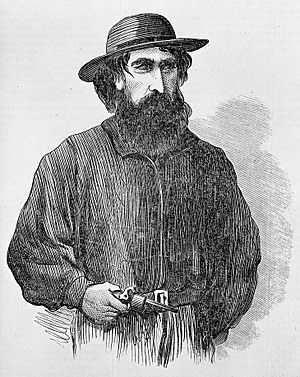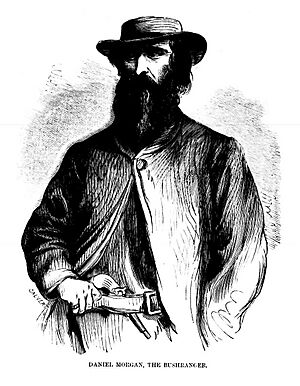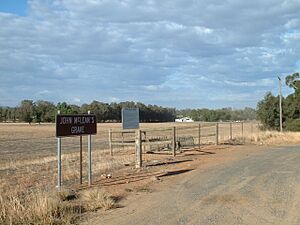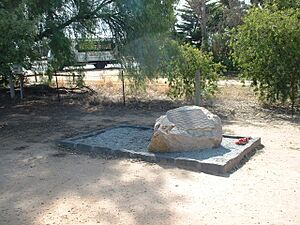Dan Morgan (bushranger) facts for kids
Quick facts for kids
Daniel Morgan
|
|
|---|---|

'Morgan the Bushranger', an 1864 woodblock print by Samuel Calvert.
|
|
| Born |
John Owen
30 April 1830 Appin, New South Wales, Australia
|
| Died | 9 April 1865 (aged 34) Peechelba station, Victoria, Australia
|
| Occupation | Bushranger |
Dan Morgan (1830 - 9 April 1865) was a famous Australian bushranger. His real name was John Fuller, but he might have used his mother's name, Daniel Owen.
Morgan was very skilled in the Australian bush. He was also an amazing horse rider. These talents helped him avoid being caught by the police for a long time.
In June 1864, Morgan shot a police sergeant. The government of New South Wales then offered a huge reward of one thousand pounds for his capture. He was killed in April 1865 after he held up a farm called Peechelba station in Victoria.
Morgan used many different names during his time as a bushranger. Some of these were Jack Morgan, John Smith, Sydney Bill, Warrigal, Dan the Breaker, Down-the-River Jack and Beardie. His life story even inspired a 1976 film called Mad Dog Morgan. The movie starred Dennis Hopper as Dan Morgan.
Contents
Early Life of Dan Morgan
Dan Morgan was born in Campbelltown, New South Wales in 1830. His mother was Mary Owen, who was known as "The Gipsy." When he was a small child, a travelling salesman from Appin named "Jack the Welshman" adopted him. Dan went to school in Appin.
As a young teenager, he got into trouble with a policeman. Because of this, he was sent to Berrima Gaol for six months. In the 1850s, he went to Victoria to search for gold.
In 1854, he was arrested for armed robbery in Castlemaine, Victoria. Judge Redmond Barry sentenced him to twelve years in Pentridge Gaol. This was the same judge who later sentenced the famous bushranger Ned Kelly. For the first two years, Morgan was kept in chains. He was also held on a prison ship called Success. After six years, he was released and went back to Appin. He then worked as a stockman, looking after cattle, near Wagga Wagga.
Becoming a Bushranger
In 1860, Dan Morgan started stealing horses. He took them from two squatters (farmers) at Whitfield, Victoria. This area was in the King River valley. The farmers, Evans and Bond, followed Morgan's tracks to his camp. They shot at Morgan, but he managed to get away.
In July 1865, Morgan and his friend, "German Bill," began robbing farms around Gundagai, New South Wales. They stole food, gunpowder, guns, watches, and horses. Morgan even robbed Henry Bayliss, who was a police magistrate from Wagga Wagga. Morgan told Bayliss he would not hurt him if Bayliss did not report the robbery to the police.
However, Bayliss did tell the police at Urana. A search party was sent from Wagga Wagga. With the help of black trackers, who were Indigenous Australians skilled in following trails, the police found Morgan’s camp. During a shooting, Morgan shot Bayliss in the hand and shoulder. Morgan escaped into the bush.
After more robberies, the government offered a reward of £500 for Morgan's capture. On June 24 1864, Morgan met two policemen near Tumbarumba. Morgan shot police Sergeant McGinnerty, who died. The other policeman, Constable Churchley, escaped. After this, the government increased the reward to £1000. In March 1865, the government declared him an outlaw. This meant anyone could shoot and kill him without warning.
"Mad Dan" Morgan
Morgan often became very angry, sometimes without any warning. Farmers in the area were afraid he would set their crops and haystacks on fire. He was especially harsh to any farmer who did not treat their workers fairly. In 1865, he held up a farm at Mohanga. He made the farmer, Bobby Rand, give all the workers a drink. Then he made the farmer dance for them until he was too tired to continue.
A newspaper in Victoria said that if Morgan came to Victoria, the police there would quickly catch him. But Morgan went to the King River area of Victoria anyway and started robbing farms. On April 8, 1865, he held up the Peechelba station (a large farm). He made the people there cook and serve him dinner.
One of the maids managed to escape and tell the neighbors what was happening. By 3:00 AM, the police had arrived from Wangaratta. Together with workers from nearby farms, they surrounded Peechelba. When Morgan came out of the farmhouse the next morning, a stockman named Jack Quinlan shot him in the back. Daniel Morgan died that afternoon, at about 34 years old.
Police Superintendent Cobham took Morgan's body back to Wangaratta. He put it on display for people to see.
Cultural Influence
Dan Morgan's life and death have inspired several stories and films. The movies Dan Morgan (1911) and Mad Dog Morgan (1976) are based on his story. Morgan also appeared as a character in the TV show Wild Boys, played by Colin Friels.
He is a character in the play Humping the Bluey, or Ransom (1911). His life is also told in a fictional way in Will Dyson's novel Red Morgan Rides (1940). It is also thought that he was the inspiration for the bushranger "Dan Moran" in Rolf Boldrewood's famous novel Robbery Under Arms, which was first published in 1882.
Two books have been written about Morgan's life: Margaret Carnegie's Morgan: The Bold Bushranger (1974) and Edgar F. Penzig's Morgan the Murderer (1989). He was also featured in the radio series Outlawry Under the Gums (1933).
The famous Australian folk song, "Waltzing Matilda", was written by Banjo Paterson. He wrote the words to a tune played by Christina Macpherson, who was a baby during one of Morgan's incidents in 1865.
Morgan, with his nickname "Mad Dog," is also mentioned in the song "Billabong Valley." This song is by the Australian rock band King Gizzard & the Lizard Wizard. It was released on their 2017 album, Flying Microtonal Banana.
Images for kids
 | Sharif Bey |
 | Hale Woodruff |
 | Richmond Barthé |
 | Purvis Young |









